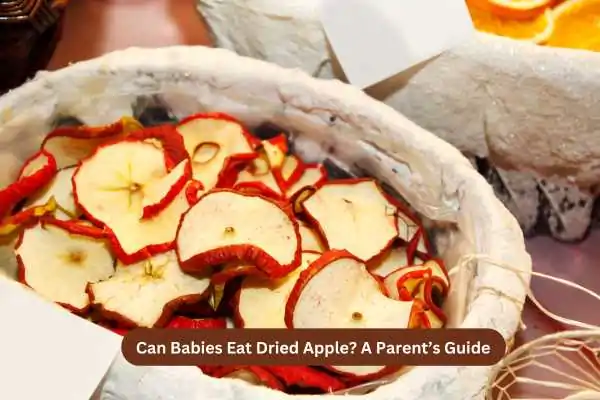As parents, we all want to make the best choices when it comes to introducing new foods to our babies. With so many snacks available on the shelves, dried fruits like dried apples often catch the eye as a healthy, convenient option. But the question remains—can babies eat dried apple safely?
This guide takes you through everything you need to know about offering dried apple to your little one, including the right age to introduce it, potential risks, preparation tips, and healthier alternatives.

What Are Dried Apples?
Dried apples are simply fresh apples that have been dehydrated to remove their water content. This process makes them smaller, chewier, and naturally sweeter in flavour. While they retain many of the vitamins and fibre found in fresh apples, their texture and concentrated sugars can pose unique challenges for babies.
Can Babies Have Dried Apple?
The short answer is not right away. For babies under 12 months, dried apple is generally not recommended as a first food. The main reasons are:
-
Choking hazard: Dried apple pieces are tough and chewy, making them difficult for babies to handle safely.
-
Digestive strain: The dense texture and concentrated sugars may be harder for a developing digestive system to process.
-
Teeth development: Babies without enough teeth will struggle to chew dried apple properly, increasing the risk of swallowing large pieces.
For infants starting solid foods around 6 months, it’s best to stick with softer preparations like pureed or steamed apples.
When Can Babies Eat Dried Apple?
Most experts suggest waiting until at least 18 months to 2 years old before introducing dried apple in small, supervised amounts. By this stage, your child:
-
Has more teeth for proper chewing
-
Can manage different textures better
-
Is less prone to choking compared to younger infants
Even then, dried apple should be offered in age-appropriate forms, such as very small bite-sized pieces, to reduce choking risks.
Health Benefits of Apples
While dried apple may not be suitable for very young babies, apples themselves are incredibly nutritious and can be introduced early in other forms. Benefits include:
-
Rich in fibre: Helps support digestion and prevent constipation.
-
Vitamin C: Boosts the immune system and aids iron absorption.
-
Natural sweetness: Provides flavour without added sugar.
Fresh, cooked, or pureed apple is one of the safest and most versatile fruits to include in a baby’s weaning journey.
Risks of Dried Apple for Babies
Before considering dried apple, it’s important to be aware of the potential drawbacks:
-
Choking risk – The tough texture can easily get stuck in a baby’s throat.
-
High sugar concentration – Dried apple is much sweeter than fresh apple, which may increase the risk of dental issues if eaten frequently.
-
Digestive upset – Too much dried fruit can sometimes cause gas or diarrhoea in little ones.
-
Added preservatives – Some store-bought dried apples may contain sulphites or added sugar, which are not suitable for young children.
Safer Ways to Introduce Apple to Babies
If you want your baby to enjoy the goodness of apples, here are safer methods:
-
Apple puree: Smooth and easy for babies as young as 6 months.
-
Steamed apple slices: Soft pieces that can be picked up as finger food.
-
Grated apple: Works well for older babies who are learning to chew.
-
Homemade apple sauce: A versatile, no-added-sugar option for mixing with porridge or yoghurt.
These alternatives provide the nutrients of apples without the risks associated with dried fruit.
Tips for Parents Considering Dried Apple
If you decide to introduce dried apple when your child is older and ready, keep these tips in mind:
-
Cut into tiny pieces to reduce choking risks.
-
Always supervise your child while eating dried apple.
-
Avoid store-bought options with added sugar or preservatives—opt for natural or homemade dried apple instead.
-
Offer in moderation as part of a balanced diet, not as a daily snack.
-
Encourage brushing after eating dried fruit to protect developing teeth from sugar exposure.
Final Thoughts
So, can babies eat dried apple? The answer depends on their age and development stage. For infants under 12 months, dried apple is best avoided due to the risk of choking and digestion challenges. Instead, focus on safe alternatives like puree, steamed slices, or grated apple.
When your child is older, usually around 18 months to 2 years, you can carefully introduce small pieces of dried apple as a supervised snack. Choosing natural, additive-free options and offering them in moderation ensures that your child gets the flavour and nutrition of apples without unnecessary risks.
As with all new foods, introduce dried apple gradually and watch for any reactions or difficulties. Every baby develops at their own pace, so follow your child’s cues and consult with your healthcare professional if you’re unsure.

